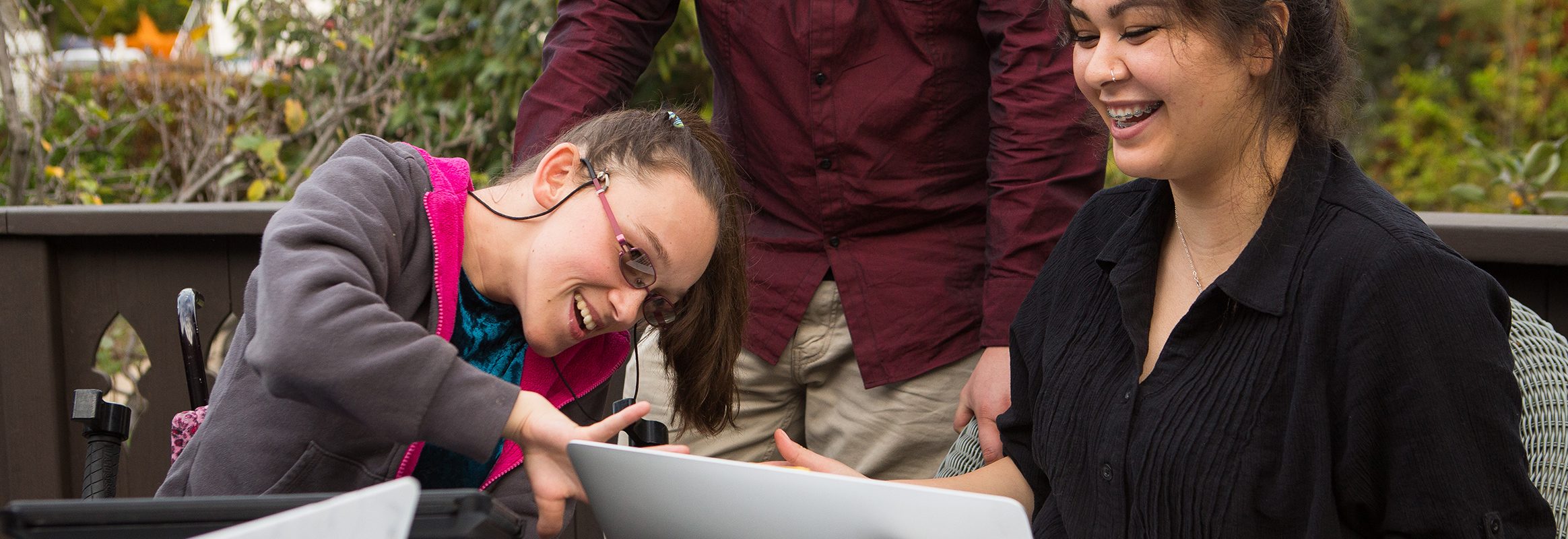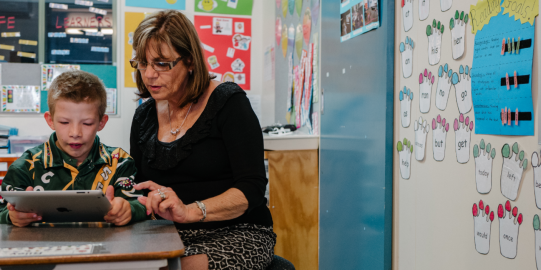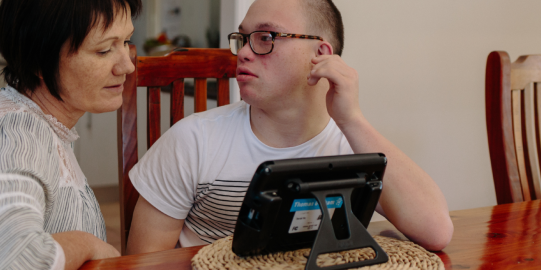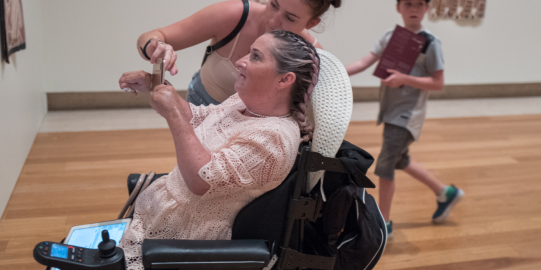Augmentative and Alternative Communication (AAC) is many things to many people. It is a field of research to some, an area of clinical practice to others, and an often imperfect but essential tool to those who rely on it for communication. For most of us, however, the field of AAC is very applied. We can read the textbooks and research, but the actual work of implementing AAC is very hands-on: we have to do it! It requires time, commitment, problem-solving, and practice. For this, we need AAC mentors.
Sonia types to communicate. She volunteers with young people with a variety of disabilities. Sonia discovered that these children and teens were fascinated by her AAC, and often opened up more when she let them type or use her AAC to talk with her. She now has multiple AAC apps on her iPad so that she can talk with them “their way.”
Daniel has always had minimal speech. Last year, he attended a conference for autistic people. There, he discovered AAC. Several AAC users helped him select an app, a case, and a Bluetooth speaker. He meets with them in regular video chats. Their coaching has helped him learn the ropes of using AAC. He feels he is able to share more with his friends and family now that he is not trying to rely on speech. He recently received a promotion at work, and he feels it is because his AAC has allowed him to interact better with the public.
Samuel’s mother attended an AAC conference to learn more about how to help her son communicate. She attended workshops where she heard directly from adults who use AAC. After the sessions, she posted in her online parent groups that her “mind is blown.” The AAC users made her re-think so many ways she supports her son. It had never occurred to her, for example, to ask his permission before adding words to his AAC vocabulary or checking his message history. She returned home from the conference and apologized to Samuel for all the things she had never considered. She feels so much closer to Samuel now. She is deeply grateful to have found adult AAC users to mentor her to support her son better. She is even more excited to help Samuel find AAC mentors of his own.
An AAC mentor is someone who has direct experience implementing AAC with themselves or others. Mentors have lived experience overcoming the barriers to communication for people who cannot rely on speech. They have personal experience on an AAC journey, that allows them to see where others are, and to provide helpful guidance to move them forward.
AAC users as mentors
AAC users can be mentors. They have more personal experience than anyone to share their story and support. Any AAC user could become a mentor to someone starting out with AAC. AAC users should not feel they have to be fully proficient with their AAC before they can be a mentor. We need more AAC users from every step in the journey to become mentors and guide others.
In interviews, AAC users shared that their AAC mentors were an essential support. They described these mentors as more skilled and experienced peers. These fellow AAC users have developed effective strategies to overcome similar communication barriers. They are generous with their time and share their experiences through conferences, blogs, or social media. The mentors show the value of AAC in their own lives and encourage others to explore it. They demonstrate use of AAC in conversation and writing. AAC users observed and engaged with these mentors and could see the path forward, inspired to see what is possible.
Researchers like Blackstone and Paterson have documented that AAC is more likely to be adopted when it supports a person's chosen life roles. Becoming an AAC mentor creates a unique opportunity to expand into new valued social roles.
Finding AAC users to be mentors
If we work as teachers or therapists:
- Do we have an AAC user who is not a client, but instead a mentor, providing us insight into the experience of using AAC?
- Do our clients or students have role models of others using AAC to accomplish goals that might seem unattainable to them? Have we helped them find older AAC role models in the contexts they wish to achieve, such as in post-secondary education or future careers or volunteer roles?
- Do our youngest or most emergent AAC users have examples of more proficient AAC users that they can observe and learn from?
- Have we invited AAC users to present at our professional conferences?
If we are family members or friends of someone who uses AAC:
- Have we found others in our community who also use AAC?
- Can we help discover online communities of AAC users? Check our list in the references section.
Professional mentors
Therapists report that even within the field of speech-language pathology, AAC training may be limited. The speech-language field is so broad that relatively few clinicians are able to specialize in AAC, and in the populations who cannot rely on speech. Only a handful of universities offer an in-depth overview of AAC research and theory, and fewer include the implementation of a broad range of AAC options. Teachers report the same about their training and studies. Therefore, teachers and therapists who are new to the field need mentors just as much as the AAC users they support.
“Include a wide range of AAC users in your conferences and literature and research -not just as research subjects but as people helping shape the direction the field goes. We should be seen as experts on AAC and communication-related disabilities just as much as outsiders who have certain college degrees or other job experience. Make sure your professional conferences have scholarships and travel stipends for at least a handful of AAC users. Make sure we have the opportunity to make presentations, not as the token client but as people who have something of our own to say.” ~endever* corbin, AAC user





